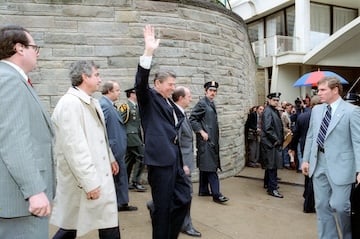When President Ronald Reagan was shot on March 30, 1981, chaos ensued behind the scenes at the White House. With no real protocol in place for such a situation, everyone involved had to improvise and hope that everything would turn out right. In an attempt to keep everyone calm, Al Haig, Reagan’s Secretary of State,… Read More "Al Haig and the Reagan Assassination Attempt — “I’m in control here”"
The Downing of KAL Flight 007
On August 30, 1983, a Boeing 747, Korean Airlines 007 took off for Seoul from New York’s John F. Kennedy International Airport. With 246 passengers and 23 crew on board, the routine yet ill-fated flight would never complete the second leg of its journey from Anchorage to Gimpo Airport. Significantly off course, Captain Chun Byung-In… Read More "The Downing of KAL Flight 007"
The Ever-changing Nature of the American Foreign Service
The Foreign Service has undergone major reforms and tinkering over the past century, so much so that people often joked that if you didn’t like the current system, just wait a few years and it would change. While there have been major improvements regarding minorities and women (the State Department of yore was often characterized… Read More "The Ever-changing Nature of the American Foreign Service"
An Iran-Contra War Story with Oliver North
Oliver North is a former United States Marine Corps Lieutenant Colonel who served as a National Security Council staff member during the Iran–Contra affair, a political scandal involving the clandestine sale of weapons to Iran, which was to encourage the release of U.S. hostages then held in Lebanon. North formulated the second part of the plan which was to divert proceeds from the arms sales to support the Contra rebel groups in Nicaragua (which… Read More "An Iran-Contra War Story with Oliver North"
The Fall of the Berlin Wall — November 9, 1989
At the end of World War II, Germany was partitioned into four separate areas, each controlled by the four allied powers: the United States, the United Kingdom, France, and the Soviet Union. As relations with the USSR deteriorated, the split hardened into just two separate regions: West Germany, supported by the United States and other… Read More "The Fall of the Berlin Wall — November 9, 1989"
The Assassination of Anwar Sadat, Part II
As a result of Anwar Sadat’s growing authoritarianism and treatment of his opposition, tensions in Egypt began rising shortly after the Camp David Accords were signed. Regular Egyptians were unsatisfied with the treaty’s results in addition to the state of the economy. His own security people had become increasingly concerned, as Sadat did not like… Read More "The Assassination of Anwar Sadat, Part II"
The Birth of the Chemical Weapons Convention (and the OPCW)
Recent events in Syria have once again spotlighted the dangers of chemical weapons and international efforts to catalog and destroy them. The Convention on the Prohibition of the Development, Production, Stockpiling and Use of Chemical Weapons and on their Destruction (otherwise known as the Chemical Weapons Convention or CWC) was opened for signature with a… Read More "The Birth of the Chemical Weapons Convention (and the OPCW)"
A Gamble for Peace – Negotiating the Camp David Accords
Unrest in the Middle East has been an unrelenting problem for centuries, the Gordian knot that cannot be cut. The founding of Israel in May 1948 further complicated matters, leading to several wars and a state of heightened tension. While there have been many international efforts to find a lasting peace in the Middle East,… Read More "A Gamble for Peace – Negotiating the Camp David Accords"
The Headache That Is the Fourth of July Party
The Fourth of July is a celebration of the United States’ independence. It is a day of family, friends, food, and a few beers. However, this is not typically the case for those representing the United States overseas. When the time comes, members of an embassy overseas are charged with putting on a big party… Read More "The Headache That Is the Fourth of July Party"
“It was something out of a B movie” — The 1980 Coup in Bolivia
Social unrest, political fragmentation, drug trafficking, and violence all characterized the late 70’s in Bolivia. All of the major parties failed to gain a majority vote, coups were attempted with an alarming frequency, and human rights violations were severe and widespread. In the early 80’s, Bolivia transitioned to democracy, but that transition was far from… Read More "“It was something out of a B movie” — The 1980 Coup in Bolivia"

